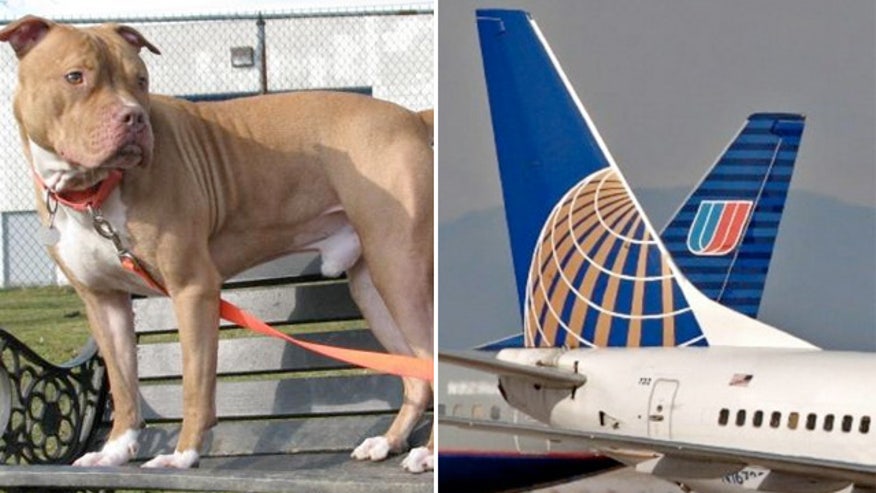
United Airlines PetSafe program bans nine breeds of dogs, inlcuding Pit Bull Terriers and American Staffordshire Terriers. (AP)
The friendly skies of United Airlines have just gotten a little less friendly for some four-legged creatures.
This month, much to the disappointment of some pet owners, United Airlines confirmed its adoption of the Continental Airlines PetSafe program as the merger of the two carriers became official.
The PetSafe program, which had been in place for several years under Continental, is considered the best in the airline industry and has won an Award for Excellence from the International Pet and Animal Transportation Association.
But not everyone is happy with United’s policy that bans nine dog breeds from planes it considers “dangerous.” Breeds, or mixes, that have reached either 6 months of age or 20 pounds that are prohibited are: Pit Bull Terriers, American Staffordshire Terriers, Presa Canario, Perro de Presa Canario, Dogo Argentino, Cane Corso, Fila Brasileiro, Tosa (or Tosa Ken) and Ca de Bou.
Until the merger, United Airlines didn’t have any restrictions on these breeds.
Mary Ryan, spokeswoman for United, told FoxNews.com that the airline adopted the PetSafe Program because it was an overall superior product. “The PetSafe Program has more resources in place: a 24-hour dedicated desk, transportation for the animals.”
But some pet owners say the ban is a discriminatory practice. Jessie Huart says she learned of the ban while trying to book a ticket to travel with her 10-year-old pit bull, Slaw. She started a petition at Change.org to encourage airline officials to remove the breed restriction in their dangerous dog policy.
“These types of policies are opposed by every major dog-related organization. The American Veterinary Medical Association and the National Animal Control Association argue that physical appearance isn’t an effective way to predict or address aggression,” the petition site says.
The airline’s policy was recently revised to eliminate the phrase “dangerous breeds,” but the ban remains.
Another change in United policy was that the airline classified pets traveling in the cargo hold as cargo rather than checked luggage. That became a problem for some traveling with pets from certain countries, especially overseas American military families who were facing potentially large third-party freight fees.
Last week, under mounting pressure, United eased restrictions. “Because we share our customers’ concern that their pets’ flights are stress-free, we have enhanced our animal acceptance policy to transport pets as both baggage (accompanying a passenger on the same plane) and cargo,” it states on its website.
Dr. Jessica Vogelsang, of Paw Curious.com, told FoxNews.com that although United is the only airline that has a ban on certain breeds, all airlines reserve the right to turn away a dog on an individual basis if he or she appears ill or aggressive.
“The American Veterinary Medical Association, the CDC, the ASPCA and the HSUS all agree that the visual appearance of a dog has no correlation to its propensity to display aggression.” Vogelsang told FoxNews.com. “I am fine with an airline making policy decisions based on evidence that are meant to keep the pet safe, but adamantly opposed to policies based on assumptions and fear that do nothing to help the pet or the owner. It certainly has nothing to do with the fact that these so called “dangerous” breeds are themselves more at risk when they travel.”
Traveling by air with animals, especially unique breeds, has never been easy. So what other options do you have with other airlines?
American Airlines, Delta Airlines, Alaska Airlines and Northwest Airlines do not have any restrictions against specific breeds. Southwest and America West/US Airlines both will not ship live animals, but they will accept legitimate service dogs inside the cabin.
Melanie Monteiro, a dog safety expert and author of “The Safe Dog Handbook,” says no matter what your dog’s breed, travelers should keep in mind a few basics.
1.Your dog must be deemed in peak health by his/her vet prior to any flight. Underlying medical conditions are one of the leading causes of air travel-related illness or death in pets. The airline’s required veterinary health certificate will cover this.
2.Short-nosed breeds (i.e., boxers, bulldogs, pugs, bull mastiffs) are prone to respiratory problems and should not fly below cabin. Overweight and elderly dogs are also at risk.
3. Check kennel size and weight restrictions (which is the combined weight of the pet, PLUS the carrier) for your particular airline.
4. Ensure your pet’s kennel is in top condition with no loose latches. The kennel must be large enough for your pet to stand up, turn around and lay down in.
5. Allow extra time for check in when traveling with pets, and ensure your dog has had a nice long walk before the flight.
As far as booking a tough breed on United or any other carrier, pet owners are advised to always call the airlines first.

